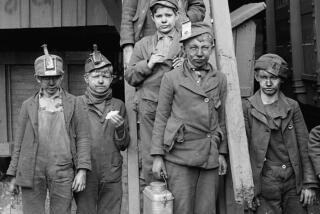Young Activist’s Death Hits Pakistani Carpet Sales : Trade: Exports to West have diminished even though producers haven’t been linked to death of 12-year-old who fought child labor.
LAHORE, Pakistan — Already hit with sagging exports, Pakistani carpet dealers say they have lost more sales to Western buyers since the killing of a young activist who spoke out against child labor.
The death of Iqbal Masih, 12, received worldwide publicity after a group that is fighting child labor blamed carpet industry owners. But residents of his village later said Iqbal was slain in a fight with a farm worker, and Pakistan’s leading human rights group says there is no evidence implicating the industry.
Iqbal’s case attracted attention because he had been to Sweden and the United States to speak at conferences denouncing child labor. He had worked as a carpet weaver from age 4 to 10.
Imran Malik, vice chairman of the Pakistan Carpet and Manufacturers and Exporters Association, estimates $10 million worth of orders have been lost since the April 16 shooting.
“Carpets that were once considered a piece of art are now looked upon as if the blood of children has been used to make them,” Malik said.
*
The carpet industry, one of the biggest exporters in this impoverished country, was facing lean times even before Iqbal’s death. Exports fell from $183 million in 1992 to $149 million last year, the government says.
The United States, the largest importer of Pakistani carpets, purchased $42 million worth last year, down from $55 million two years earlier.
“With this controversy, our wholesale carpet buyers don’t want to take the risk and buy Pakistani carpets,” said Abdul Latif Malik, a leading Lahore carpet dealer who says he has lost at least $300,000 in sales since Iqbal’s death. He is no relation to the vice chairman of the carpet association.
Usman Ashraf of Usman Carpet House in Lahore said he has lost $80,000 in sales since mid-April. “It is all related to the young boy’s death,” he said.
Both dealers said Western buyers had contacted them to say they would not be making further purchases due to the furor over the killing.
But in New York, carpet dealers contacted by the Associated Press said they had seen no backlash against Pakistani carpets since Iqbal’s death, although one said reports of child labor overseas had sparked questions from a few customers.
“There isn’t a major scare that I’m aware of, but all carpets have not been selling as well because of the downturn in the economy,” said Michael Harounian, a partner in the New York-based Harounian Imports.
Harounian and Larry Feldman, president of the Rug Warehouse in New York, both said they try to ensure they do no business with carpet makers who use child labor.
*
Anti-Slavery International, a British-based group that campaigns against forced labor, estimates carpet makers employ about 500,000 children under 14 years old in Pakistan, 300,000 in India and 110,000 in Nepal.
Children are prized by carpet makers because their tiny fingers make small, tight knots, the sign of a truly fine carpet.
Hand-knotted carpets also are made in Iran, China, Afghanistan, Morocco, Turkey, Peru and some former Soviet states.
“Apart from the former Soviet Union, where we have no information, we have information to suggest that child labor is used to some extent in all these countries,” said David Ould, spokesman for Anti-Slavery International.
It was the campaign against child labor that drew attention to Iqbal’s killing.
The Bonded Labor Liberation Front, a private group in Pakistan, blamed the slaying on Pakistan’s “carpet mafia,” although it provided no evidence.
An AP reporter who visited Iqbal’s village outside Lahore was told by numerous residents that the youth was shot by a farm worker after a petty dispute. Iqbal’s cousin, who was wounded in the shooting, told the same story to police, who have arrested the farm worker.
The independent Human Rights Commission of Pakistan, the country’s most respected human rights group, said it found no evidence tying the carpet industry to Iqbal’s death.
In dirt-poor villages where there are not enough schools, children are routinely sent out to find work in mills, brickyards and garages before they reach their 10th birthday.
The conditions are often filthy and dangerous and the daily pay can be as little as one rupee--the equivalent of three cents. But in such an impoverished region, many people accept child labor as normal, including the children.
“Children themselves say, ‘We’re earning a living.’ The family says they need the money,” said Shireen Khan, a spokeswoman in Islamabad for the International Labor Organization, a United Nations group.
Pakistan passed legislation in 1992 that says children under 14 are not allowed to work, but the law is not enforced.
If Pakistan does not show some progress, it could lose preferential tariffs on its carpet imports into the United States, Commerce Minister Ahmed Mukhtar said.
“It’s like a sword dangling over our head,” he said.
More to Read
Inside the business of entertainment
The Wide Shot brings you news, analysis and insights on everything from streaming wars to production — and what it all means for the future.
You may occasionally receive promotional content from the Los Angeles Times.










